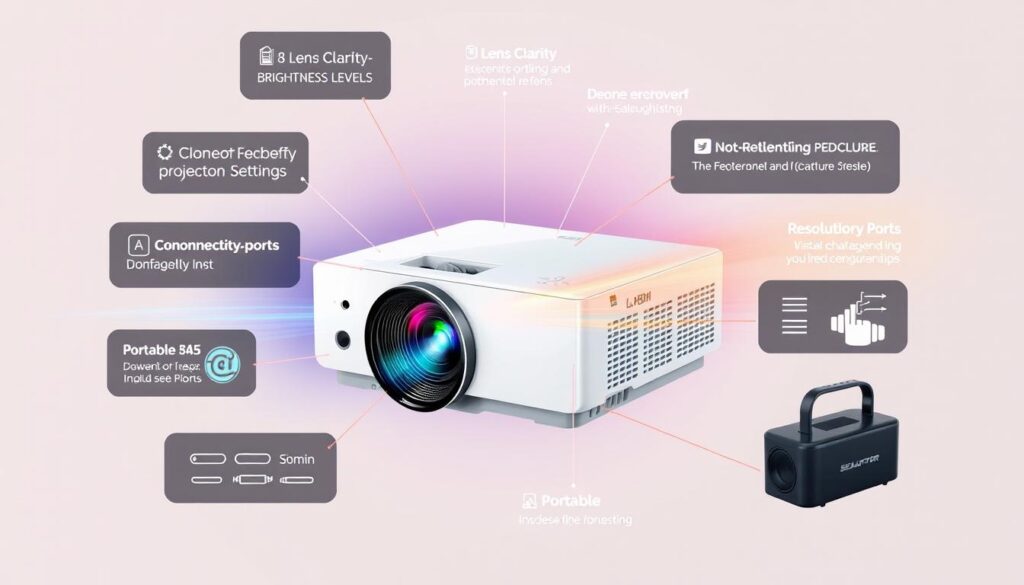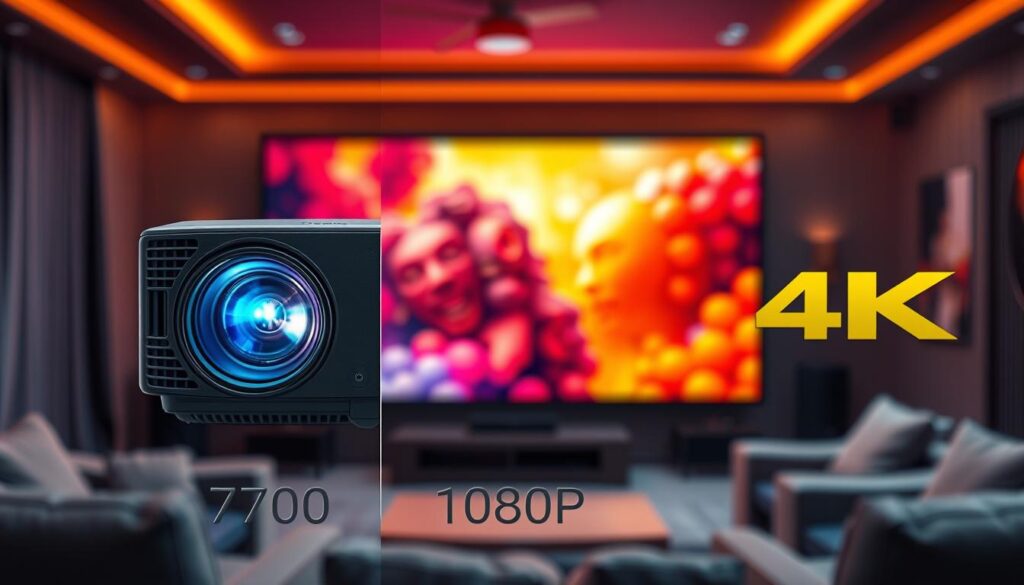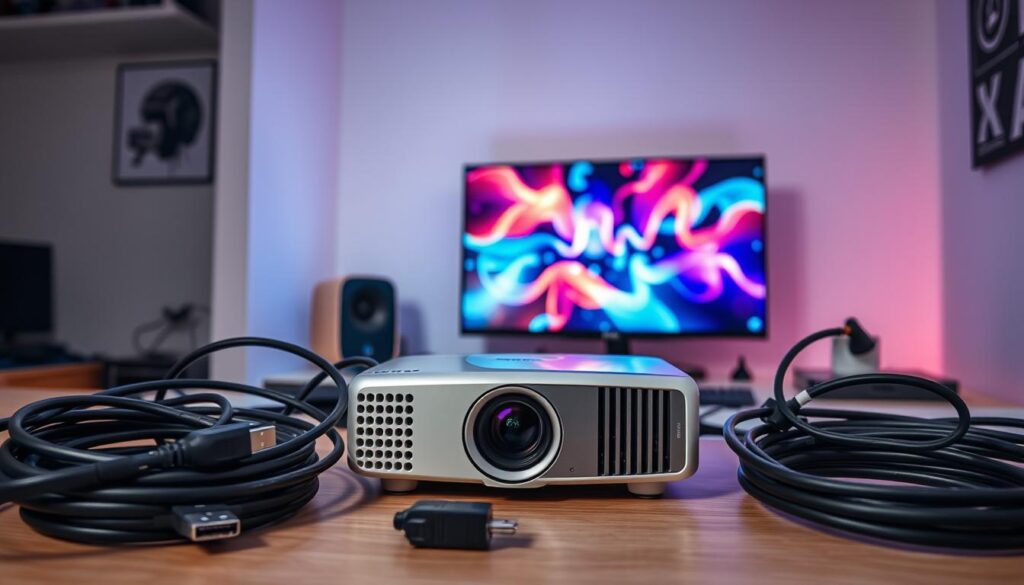Choosing a projector can be tough with so many choices. That’s why a good buying guide is key. We’ll help you pick the best projector for your needs, whether it’s for home, work, or school. Our aim is to give you the info you need to find the perfect projector that fits your budget.

It’s important to think about things like resolution, brightness, and how it connects. A good guide will help you understand these points. Whether you need a projector for a small space or a big room, we’ve got advice for you.
Key Takeaways
- Choose a projector that meets your specific needs and budget
- Consider factors such as resolution, brightness, and connectivity options
- A reliable projector buying guide can help you make an informed decision
- Look for the top best projector that suits your needs, whether it’s for home, business, or educational purposes
- Consider the room size and ambient light when selecting a projector
- A good projector should have the right balance of features and price
Understanding Projector Basics: What You Need to Know
When it comes to projector basics, knowing the basics is key. Projection technology has grown a lot, offering many choices for different needs. Whether for home fun, work, or school, understanding the basics is crucial.
Start by learning about projection technology types like DLP, LCD, and LCoS. Each has its own good points and areas to work on. For example, DLP projectors are great for home theaters because of their bright colors and clear images.
Different Types of Projection Technology
- DLP (Digital Light Processing)
- LCD (Liquid Crystal Display)
- LCoS (Liquid Crystal on Silicon)
Knowing projector basics and projection technology helps you pick the right one. Whether you’re new or experienced, understanding these basics improves your viewing experience.
Breaking Down Essential Projector Features
When you read projector reviews, it’s key to know the main features. Projector features like brightness, resolution, and connectivity are vital. They help decide how well the projector works.
A top-notch projector should have high resolution for clear images. Make sure it has HDMI and USB ports for easy connection with your devices. Also, the projector’s brightness should match your room’s size and light.

Looking at theseprojector features and readingprojector reviews helps you choose wisely. This way, you find a projector that fits your needs perfectly.
How to Choose the Top Best Projector for Your Space
Choosing a projector involves several key factors. Whether for a home theater or presentations, home theater projectors are a top choice. The placement of the projector is crucial for image quality.
Room Size Considerations
The room’s size is a major factor in picking a projector. A bigger room needs a more powerful projector for a clear image. Here are some tips for choosing a projector based on room size:
- Measure the distance from the projector to the screen
- Calculate the screen size based on the room dimensions
- Choose a projector with enough lumens to fill the room
Ambient Light Factors
Ambient light affects image quality. Bright rooms need a projector with high lumens. A projector with a high contrast ratio ensures a clear, vibrant image.
Mounting Options and Placement
Think about the projector’s mounting and placement. Choose a spot that offers a clear view of the screen and minimizes distractions. Popular options include ceiling mounts, wall mounts, and floor stands. By considering these, you can find the best home theater projectors for your space and enjoy a great viewing experience with proper projector placement.
| Projector Type | Room Size | Ambient Light | Mounting Options |
|---|---|---|---|
| Home Theater Projector | Small to Medium | Low to Medium | Ceiling Mount, Wall Mount |
| Business Projector | Medium to Large | Medium to High | Wall Mount, Floor Stand |
Resolution and Image Quality Explained
When looking at projectors, projector resolution and image quality are key. A higher projector resolution means a clearer and more detailed picture. This is very important for places where image quality matters a lot.
In home theaters, for example, a high projector resolution makes the movie experience feel more real.
Image quality is also tied to the projector resolution, which is counted in pixels. You’ll often see HD, Full HD, and 4K resolutions. To pick the right projector resolution, think about how you’ll use the projector. For gaming or movies, 4K is a good choice.
- HD: good for simple presentations
- Full HD: best for home theaters and gaming
- 4K: offers the highest detail for movies
Choosing the right projector resolution and image quality depends on your needs. By thinking about this, you can find a projector that meets your image quality needs.

Brightness and Lumens: Finding Your Sweet Spot
When choosing a projector, projector brightness is key. It’s measured in lumens, which shows how clear and vibrant your image will be. Knowing about lumens and picking the right brightness is vital for a great viewing experience.
A projector with more lumens is brighter, perfect for big screens or bright rooms. But, too much brightness can hurt image quality. Think about where you’ll use your projector. A home theater might need less brightness than a conference room or an outdoor movie night.
Here are some general guidelines for recommended brightness levels in different settings:
- Home theater: 1,000-2,000 lumens
- Conference room: 2,000-3,000 lumens
- Outdoor movie night: 3,000-5,000 lumens
By matching your space’s needs with the right projector brightness, you’ll get a top-notch viewing experience. Don’t forget to look at resolution and image quality too. This will help you find the ideal projector for your needs.
| Setting | Recommended Brightness (lumens) |
|---|---|
| Home theater | 1,000-2,000 |
| Conference room | 2,000-3,000 |
| Outdoor movie night | 3,000-5,000 |
Connectivity Options and Modern Features
Having the right projector connectivity can really change your viewing experience. With modern features like wireless and smartphone integration, connecting your devices is easy. This lets you enjoy your favorite content without hassle.
Some projectors come with HDMI, USB, and Wi-Fi. This means you can link up your laptop, smartphone, or tablet. Then, stream your favorite movies, TV shows, or presentations.

Modern projectors also have cool modern features. These include built-in speakers, 3D, and high-definition resolution. These features make your viewing experience better and more immersive. Here are some benefits of modern projectors:
- Easy connectivity options
- High-definition resolution
- Built-in speakers
- 3D capability
In summary, projector connectivity and modern features can really improve your viewing experience. By picking a projector with the right options and features, you get a more immersive and engaging experience.
| Feature | Description |
|---|---|
| Wireless Connectivity | Connect your devices to the projector without cables |
| Smartphone Integration | Stream content from your smartphone to the projector |
| High-Definition Resolution | Enjoy clear and detailed images |
Home Theater Projectors: Creating the Ultimate Experience
Home theater projectors are great for an immersive experience. They show high-quality images and work well with audio systems. To enjoy your movies and shows fully, think about audio integration, screen choice, and room setup.
Here are some tips for a better experience:
- Look for a projector with audio integration like Bluetooth or Wi-Fi. This lets you stream audio from your devices.
- Pick a screen that matches your projector’s quality. This ensures a clear and bright image.
- Adjust your room’s lighting and seating for the best view. This helps reduce distractions and improves your experience.
A well-made home theater system can take you to new places and stir strong feelings. By choosing a top-notch home theater projector and focusing on audio integration, you can have a movie-like experience at home.
| Projector Feature | Importance |
|---|---|
| Resolution | High |
| Brightness | Medium |
| Audio Integration | High |
Business and Educational Projector Solutions
Choosing the right business projectors and educational projectors is key for presentations and lectures. They show high-quality images and videos. This grabs the audience’s attention and boosts learning.
In business, business projectors are great for presentations and meetings. They have high brightness and resolution. They also connect easily to devices, making sharing content simple. For schools, educational projectors are vital for interactive learning. They display videos, presentations, and simulations, making learning fun and engaging.

Using business projectors and educational projectors offers many benefits:
- Enhanced engagement and participation
- Improved retention and understanding of information
- Increased productivity and efficiency
- Cost-effective and flexible solutions
Investing in the right business projectors and educational projectors leads to better learning environments. This results in improved outcomes and success for all.
Gaming Projectors: What Makes Them Special
Gaming projectors aim to give gamers a fully immersive experience. They have features like low input lag and high refresh rates. It’s key to look at these when picking a gaming projector for a smooth gaming session.
Input Lag Considerations
Input lag is the delay from sending a signal to seeing it on the screen. For gamers, it’s important to have low input lag to avoid lag and ensure a quick response. Choose projectors with the lowest input lag in milliseconds.
Refresh Rate Requirements
A high refresh rate is crucial for a smooth gaming experience. Aim for at least 120Hz, but 240Hz or 300Hz is even better. When picking a gaming projector, consider these factors:
- Low input lag for a responsive experience
- High refresh rate for a smooth visual experience
- High-resolution display for detailed graphics
By focusing on these aspects, you can get a top-notch gaming experience. Remember to research and compare different models to find the perfect gaming projector for you.
Portable Projectors: Mobility Meets Performance
When it comes to projectors, portability is key. Portable projectors let you take your show on the road. They’re powerful and packed with features, perfect for both work and play.
Portable projectors are great because they’re easy to move around. They’re small and light, making them simple to carry. Plus, many have built-in speakers and batteries, so you can use them anywhere.
Here are some important features to look for in a portable projector:
- High brightness and resolution for clear images
- Long battery life for extended use
- Compact and lightweight design for easy transport
- Wireless connectivity options for easy setup
With the right portable projector, you can enjoy top-notch visuals and sound anywhere. They’re perfect for anyone who needs to be on the move. Whether you’re in business, teaching, or just love movies, a portable projector is a great addition.

Budget Considerations and Price Ranges
When you’re looking to buy a projector, setting a projector budget is key. The cost can vary a lot, based on what features and quality you want. Knowing the different price ranges helps you make a smart choice.
Entry-Level Options
Entry-level projectors are perfect for those watching their budget. They have basic features and cost between $200-$500. Brands like Epson and BenQ are popular in this range.
Mid-Range Choices
Mid-range projectors have better features and image quality. They cost between $500-$1,500 and are good for home theaters and small businesses. Sony and Optoma are well-known in this category.
Premium Features Worth the Investment
Premium projectors have top-notch features and image quality. They cost between $1,500-$5,000 and are best for large businesses and professional use. Christie and Barco are top brands in this range.
Finding the right projector depends on your projector budget and understanding the price ranges. This way, you can find a projector that suits your needs and budget.
Maintenance and Care Tips for Longevity
Regular projector maintenance is key to making your device last longer. Simple care tips can help avoid damage and keep your projector running smoothly. Here are some tips to help you:
- Turn off the projector when not in use to prevent overheating.
- Clean the lens and filter regularly to maintain image quality.
- Update the projector’s software to ensure you have the latest features and security patches.
It’s also important to handle your projector with care. Don’t touch the lens or other sensitive parts. Store it in a dry, cool place. By following these care tips, you can enjoy your projector for many years.
Remember, proper projector maintenance is crucial for a long-lasting device. Spending a few minutes each week on maintenance can save you from expensive repairs. It also ensures your projector works at its best.
| Maintenance Task | Frequency |
|---|---|
| Clean the lens and filter | Weekly |
| Update the projector’s software | Monthly |
| Check for dust and debris | Quarterly |
Common Projector Problems and Solutions
Using a projector can sometimes lead to issues that affect your presentation or movie night. Knowing about projector problems and their solutions can make fixing them easier.
Troubleshooting Guide
To solve common projector problems, try these steps:
- Check the power cord and ensure it is properly connected.
- Verify that the projector is set to the correct input.
- Adjust the focus and zoom to optimize the image quality.
When to Seek Professional Help
Some projector problems need a pro’s touch. If you can’t fix an issue or it keeps happening, reach out to the manufacturer or a tech expert.
Future-Proofing Your Projector Investment
Buying a projector means thinking about projector future-proofing to make it last. A good projector is a big investment. You want it to stay useful as technology changes.
Look for projectors with the newest connections like HDMI 2.1 and USB-C. These let you use new tech and devices. Also, choose one with high resolution and brightness for the best picture and flexibility.
Some important features for future-proofing your investment include:
- 4K resolution or higher
- High brightness (measured in lumens)
- Latest connectivity options (HDMI 2.1, USB-C, etc.)
- Support for emerging technologies (such as HDR and 3D)
By focusing on these points and choosing a quality projector, you’ll get a great view for years. This keeps your projector investment up-to-date and functional, giving you a top-notch viewing experience.
With the right projector, you’ll enjoy great views and feel secure about your investment. So, when you’re looking for a projector, remember projector future-proofing. Find one that fits your needs and budget.
| Feature | Importance | Description |
|---|---|---|
| 4K resolution | High | Provides a high-quality image with detailed resolution |
| High brightness | Medium | Ensures a clear image in various lighting conditions |
| Latest connectivity options | High | Allows for easy connection to new devices and technologies |
Conclusion: Making Your Final Projector Selection
As you finish this guide, you’re ready to pick the best projector for you. You’ve learned about projector tech and key features. This guide has helped you understand the projector world better.
Think about your needs when choosing a projector. Consider room size, lighting, mounting, image quality, brightness, and connectivity. Match your needs and budget to find the perfect projector.
The right projector can change your viewing experience. It can make your presentations better or your gaming more immersive. Trust your research and make a choice that will last for years.
FAQ
What are the different types of projection technology?
There are three main types: DLP, LCD, and LCoS. Each has its own strengths and weaknesses. They differ in image quality, brightness, and cost.
What are the key specs to consider when choosing a projector?
Important specs include resolution, brightness, contrast ratio, and connectivity. Also, think about the throw distance. The right specs depend on how you plan to use the projector.
How do I determine the right projector brightness for my space?
Brightness, measured in lumens, is key for a good image. For rooms with some light, aim for 2,000 lumens. For very bright rooms, go for 3,000-4,000 lumens.
What are the advantages of a home theater projector?
Home theater projectors offer a deep, cinematic feel. They have high contrast ratios and advanced image processing. They also work well with audio systems for a top-notch home theater.
How do I choose the right resolution for my projector?
The right resolution depends on your screen size and viewing distance. For a home theater, 1080p or 4K is best. They give a clear, detailed picture.
What are the key features to look for in a gaming projector?
Look for low input lag, high refresh rates, and HDR support. These ensure a smooth, colorful gaming experience with deep blacks.
How do I future-proof my projector investment?
For a future-proof projector, look for 4K resolution, HDR, and HDMI 2.1. These features will keep your projector up-to-date with new video and gaming standards.

